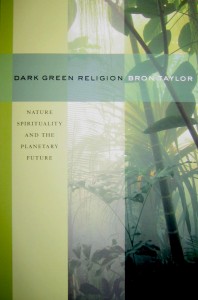On November 24, 1859, Charles Darwin published his On the Origin of Species. I learned this from Bron Taylor during a reading from his new book,  Dark Green Religion: Nature Spirituality and the Planetary Future, at the Boulder Book Store a couple weeks ago.
Dark Green Religion: Nature Spirituality and the Planetary Future, at the Boulder Book Store a couple weeks ago.
So what does On the Origin of Species have to do with nature spirituality? Bron thinks a whole lot. After Darwin, he says, Western religion was never the same. He told me that night,
It’s taken us 150 years for religion to absorb the impact of Darwin.
I wanted him to spell it out the details in his book, but he leaves it instead to common knowledge: Darwin brought about a seismic shift in in the thinking of cultures derived from Europe and, increasingly, others as well. No longer could humans regard themselves as the apex of creation, the topmost rung of the great chain of being. Instead, we had to begin to see ourselves as part and parcel of the Earth, formed like other species from the long flow of changes—sometimes sudden and dramatic, other times gradual—that make up the history of the Earth.
It was a fundamental shift in the story of our origins, and Taylor says it has had sweeping results.
Where this cognitive shift has been most deeply made, traditional religions with their beliefs in nonmaterial divine beings are in decline [or] find themselves on the defensive.
Into the vacuum left by the decline of conventional religions is now flowing Earth-based religion, what Taylor calls “dark green religion.” (If “green religion” means adding environmental awareness to conventional religion, “dark green religion” means turning awe and reverence toward the Earth or nature itself.) And dark green religion he says, is the fastest-growing religious phenomenon around the world.
Taylor should know. He is a longtime scholar and researcher of religion and the editor of the massive Encyclopedia of Religion and Nature, a project out of which grew the International Society for the Study of Religion, Nature, and Culture. This is the society Taylor founded and for which he served as the first president, and it is the group that has provided some of my most formative conference experiences (including the conference in Amsterdam last summer).
I’m not sure I agree with Bron that the change can be traced to Darwin. Obviously, for starters, plenty of Indigenous people in the world did not need Darwin to arrive at biophilic religion, or a spirituality of interdependence with and love of the complex web of species that make up all the neighbors on Earth.
I think we need to look further back: to the scientific revolution of the seventeenth and eighteenth centuries in Europe, which turned people’s gaze from Heaven to Earth. Both Darwin and his fiercest opponents, the fundamentalists, are products of the scientific revolution. Only after science insisted on this-worldly stories of cause and effect did the Darwinian model of evolution become conceivable. And only after people became used to defining truth in terms of literal facts could Christian fundamentalism be born. Prior to the seventeenth century, it was unheard of for people to view religious texts as providing factual, scientific evidence about the story of the world. Scientific thinking birthed both Darwin and fundamentalists.
Nevertheless, we do owe an enormous debt to Darwin and his Origin of Species. Taylor notes that Darwin was the starting point for the influential ecologist and ethicist Aldo Leopold and his “land ethic.” He quotes Leopold:
We know now what was unknown to all the preceding caravan of generations [before Darwin]: that [humans] are only fellow-voyagers with other creatures in the odyssey of evolution. This new knowledge should have given us . . . a sense of kinship with fellow-creatures; a wish to live and let live; a sense of wonder over . . . the biotic enterprise.
And Darwin himself, in his final paragraph from Origin of Species, exudes a flavor of nature religion (a naturalistic, this-worldly flavor) that finds wonder and awe in our kinship with all others. As Taylor quotes that closing:
It is interesting to contemplate . . . that these elaborately constructed forms, so different from each other, and dependent on each other in so complex a manner, have all been produced by laws acting around us. . . . There is grandeur in this view of life, with its several powers, having been originally breathed into a few forms or into one; and that, whilst this planet has gone cycling on according to the fixed law of gravity, from so simple a beginning endless forms most beautiful and most wonderful have been, and are being, evolved.
For more information: See Bron Taylor’s op-ed in the Gainesville Sun commemorating the release of Darwin’s Origin of Species on Nov. 24.
Go Darwin! Take that, Kansas!!
Priscilla, thank you for bringing Bron Taylor’s insight about “dark green religion” to my attention, along with your own perspective. I myself intuit it as “deep green.”
Whenever I open your blog, I get lost in it for hours, wandering all too happily from post to post and link to link. Here’s a general comment for all your other posts: Fabulous!
Gail, thanks for being such an appreciative reader! I like your suggestion to call it “deep green” religion rather than “dark green.” I think the word “dark” carries (possibly racist) overtones of danger and fear. To me it calls up old European images of the “dark” forest–which for my ancestors was a place to be feared, and then cleared.